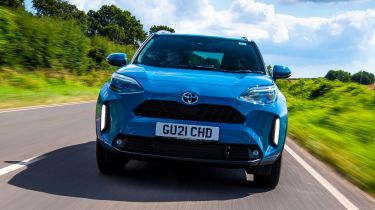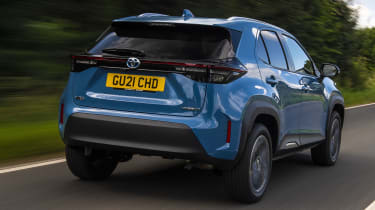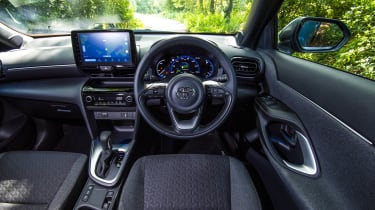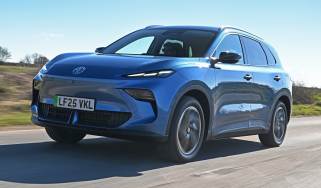Toyota Yaris Cross hybrid review
Toyota’s answer to the Nissan Juke is efficient and practical, although limited space in the rear means it may not be suitable for everyone
Pros
- Looks
- Efficiency
- Practicality
Cons
- Interior quality
- More expensive than rivals
- Limited space in the rear
| Car type | Fuel economy | CO2 emissions | 0-62mph |
|---|---|---|---|
| Hybrid | 55-64mpg | 100-117g/km | 11.2-11.6s |
While it has a long history of producing reliable 4x4s and large SUVs like the Land Cruiser and RAV4, Toyota has taken its time launching a small SUV to rival the likes of the Nissan Juke, Honda HR-V and Hyundai Kona. But, a decade after the launch of the original Juke kicked off the small SUV craze in the UK, Toyota has hit back with this: the Yaris Cross, which will be perfect if you think the C-HR is a little too big.
As the name suggests, the Yaris Cross shares a platform with the similarly electrified Yaris supermini. That means it runs the same 'self-charging hybrid' powertrain, which features a 1.5-litre three-cylinder petrol engine and a small electric motor, as well as Toyota's 'e-CVT' automatic transmission. Unlike the Yaris hatchback, all-wheel drive is available on higher-spec Yaris Cross models; these get an additional electric motor to power the rear wheels. Examples fitted with this ‘AWD-i’ powertrain, as Toyota calls it, emit slightly more CO2 and use a little more fuel per mile.
That’s not to say the Yaris Cross is inefficient, in either front or all-wheel-drive forms. The former emits as little as 100g/km of CO2, while the corresponding figure for AWD-i cars is 117g/km – in both cases, lower than what the new Honda HR-V records. The Toyota is also on par with rivals when it comes to fuel economy, with front-drive cars capable of up to 64mpg – more than either the Hyundai Kona Hybrid or Toyota’s own C-HR can return – while the AWD-i variants can hit up to 55mpg, according to Toyota.
Reaching or even exceeding those figures shouldn’t be a problem, though; when we tested a front-drive Yaris Cross in a variety of driving conditions, including around town and on some twistier B-roads, it effortlessly achieved over 60mpg. Switch to Eco mode and rein in your lead foot, and you might even hit 80mpg.
However, the Yaris Cross isn't what you'd call quick, taking a leisurely 11.6 seconds to get from zero to 62mph in front-drive configuration (decreasing slightly to 11.2 seconds if you go for all-wheel drive). But again, that's on par with figures for the Hyundai Kona and Kia Niro hybrids – and good enough for most everyday usage. However, it must be said throttle response is a bit slow. On the plus side, steering and body control are good and the car feels relatively composed and comfortable on the road – although some may find the suspension to be on the firmer side.
That’s likely to be especially true of the GR Sport trim level, introduced in autumn 2022. Toyota says the suspension of this model has been tuned for enhanced steering, roll and grip feel, which may suggest it’s more firm than the standard setup. It also boasts 18-inch wheels, the largest size available on the Yaris Cross.
Inside, the Yaris Cross can’t compete with rivals like the Ford Puma, due to its fairly dated instrument panel and too many scratchy plastics up front. However, while Toyota’s infotainment system has been a weak point in the past, there are some gains in that department. The eight-inch infotainment touchscreen that’s standard on the entry-level model is a significant improvement over the technology in older Toyotas, while all versions come with Apple CarPlay and Android Auto smartphone connectivity, too.
Being an SUV, the Yaris Cross needs to be more practical than the Yaris supermini at least. Thankfully, there’s up to 397 litres of boot space – over 100 more than the hatchback – or up to 460 litres if you pack the car up to the roof, which again is on par with the best in this class. However, the load lip of the boot is somewhat high and while rear-seat passengers will be fine for headroom, they may complain about tight leg and kneeroom due to the hybrid system’s battery under the rear seats, suggesting this car is aimed more at young families or couples.
Overall, the Yaris Cross delivers exactly what we’ve come to expect from a compact SUV, with the addition of an exceptionally efficient hybrid powertrain that can return decent miles-per-gallon without stressing you out. Interior quality is also good, with well integrated technology that means the car is worth considering for more than just its good looks. For a more in-depth look at the Toyota Yaris Cross, read on for the rest of our detailed review...






